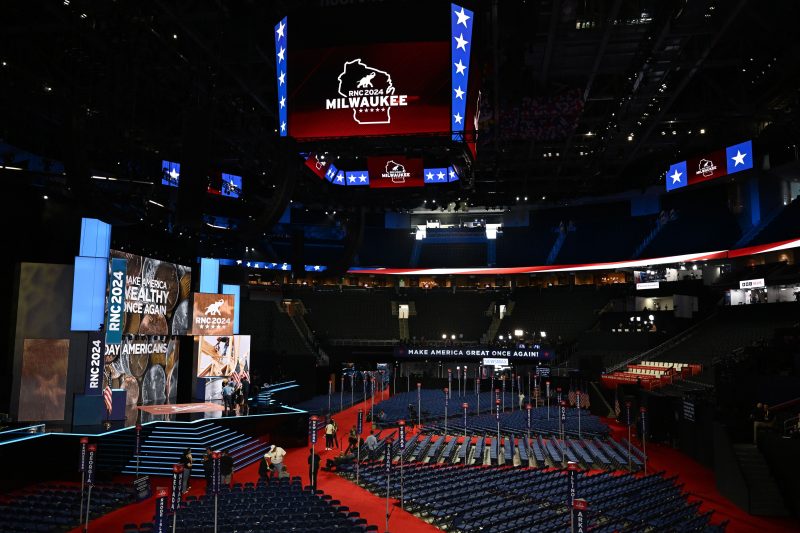In the chaotic hours after former president Donald Trump was spirited offstage Saturday by Secret Service agents, his face streaked with blood, a doctored photo of the scene began bouncing around on X, falsely showing Trump with a wide smile.
The faked photo was held up as bolstering a baseless theory, promoted among some on the far left, that the shooting — deemed an attempted assassination by law enforcement — had been staged to boost Trump’s political chances. “Why is he so happy?” one woman said in an X post viewed more than 900,000 times.
Why is he so happy? https://t.co/xtXUEm9EDD
— Cheri Jacobus (@CheriJacobus) July 14, 2024
The altered image, like another one that showed the grimaces of Secret Service agents manipulated into grins, highlighted how the historic moment — captured live from multiple angles — was being warped online in real time, as social media users worked to skew the truth of what happened, win attention or score political points.
As the Republican National Convention in Milwaukee opens Monday, the confusion hasn’t ebbed, even as more details of the shooting emerged. On Sunday, tens of thousands of X users saw or shared a baseless post suggesting an official conspiracy to harm the former president. The post purportedly came from one of the rally’s countersnipers, who said the Secret Service refused to let him fire on the gunman. The claim was sourced only to 4chan, an anonymous message board infamous for lies and trolls.
While GOP delegates gather in Wisconsin, social media platforms are stoking false narratives amid the most divisive presidential campaign in recent history. Some of the biggest have backed away from moderating content, partly out of concern about drawing blowback for removing too much. Sites once lauded as places for views to be exchanged have increasingly become echo chambers for those with like-minded political views serving up falsities to bolster shared beliefs.
The conspiracy theories bubbling up on social media since Saturday’s shooting in Butler, Pa., have given conservatives and liberals alike a lens through which to explain and process such a catastrophic event, said Dannagal Young, a professor of communication and political science at the University of Delaware who studies conspiracy theories.
“The kind of content that goes viral is the content that is moral and emotional,” regardless of accuracy, and it can drive people to political extremes, Young said. After an event like Saturday’s shooting, “it’s like all you think about is how the world looks through the lenses of your partisan glasses,” she added. It was “a match that was just lit and thrown.”
The flurry of false information threatened to muddle the public understanding of what happened ahead of the GOP convention, where Trump arrived Sunday. The presumptive Republican nominee is scheduled to address delegates Thursday, after a parade of GOP heavyweights, celebrities and Trump family members who are expected to demonstrate a party in lockstep behind Trump, especially in the wake of his close call in Pennsylvania.
Trump and his allies often draw political rhetoric from X and other social media platforms, foreshadowing the possibility that some of the claims could be repeated on the convention stage. Key speakers — including potential vice-presidential nominee Sen. J.D. Vance (R-Ohio) — took to social media to blame the assassination attempt on President Biden’s campaign. Trump’s convention speakers include some of his top social media supporters, including Turning Point USA Founder Charlie Kirk.
Saturday’s shooting also appeared to energize political opportunists keen to undercut their ideological opponents and recruit new allies.
“Time to get to work[,] meme army,” said a post on the pro-Trump message board Patriots.win. The post included a cartoon comparing Trump’s reaction to the shooting with an onstage fall by Biden last year. Some posts on the site were removed by moderators, one of whom warned users not to “spread messages which my backfire on you, or this site.”
In the comments on one of Trump’s posts on his social network Truth Social, his followers championed his bravery after the shooting and accused his political opponents of being behind the attack. One comment — which showed an illustration of President Abraham Lincoln’s assassination and was captioned “When Democrats don’t get their way, they get dangerous” — was liked more than 3,000 times.
In the aftermath of a shocking episode like Saturday’s shooting, people don’t just want to understand what happened, but for that information “to align with our political aims, if possible,” said Kate Starbird, a University of Washington professor who studies information flows. “We are all currently participating in a massive ‘collective sensemaking’ process, attempting to gather and interpret evidence to give meaning to this terrible event,” she wrote on Bluesky. Online audiences enter the fray to “signal their political identity … and help their political team.”
The welter of false theories isn’t set to die down as facts emerge over Saturday’s shooting, given that many Americans see threats to the country’s democracy, said Brian Fishman, who led Meta’s effort to stem terrorism and hate on its platforms before co-founding Cinder, a company that promotes internet trust and safety.
“Misinformation is more resonant when social divisions and political divisions are starker and that always happens during a political campaign,” he said. “People have lost confidence in those sort of foundational facts and truths, and that’s a really dangerous place to be.”
Social media is less policed and more fragmented than three years ago, when Biden and U.S. lawmakers promised a political reckoning in Silicon Valley following the Jan. 6 attack on the Capitol. In the immediate aftermath, Democrats criticized social media companies for providing Trump an online megaphone to make false claims about the results of the election, and law enforcement scrutinized the way the rioters used group chats and fringe platforms to organize the attack.
But Congress and the Biden administration ultimately did not develop new rules that would make tech giants more responsible for the violent screeds or falsehoods that circulate on their platforms. The Jan. 6 committee’s 800-plus-page report left out the evidence that the committee collected on the role platforms such as Twitter, Facebook and others played in the attack, due to political tensions on the committee and fear of a public battle with the tech giants.
Meanwhile, Republicans used their control of the House to investigate what they saw as systematic censorship of their views online, conducting a probe that eventually eroded some of the key academic programs and government initiatives to stem conspiracy theories and other falsehoods online.
Mainstream social media companies — including X, Meta and YouTube — have weakened or eliminated policy and programs meant to fight political misinformation. Following billionaire Elon Musk’s purchase of Twitter in October 2022, tech companies cut teams that handled misinformation and reversed policies barring certain political conspiracy theories — such as the notion that the 2020 election was rigged. The platforms have also largely removed the restrictions they placed on Trump’s accounts in the fallout of Jan. 6, after suspending him for violating their rules on inciting violence.
As Americans have grown increasingly polarized, Democrats and Republicans have started to consume and share social media content in more partisan ways. Right-leaning internet users often flocked to platforms such as Rumble, TruthSocial and Telegram to consume and spread commentary and information about the shooting while many on the left stuck to mainstream sites such as Instagram, Facebook and Twitter. Even mainstream social media sites such as Facebook can funnel people into environments where they mostly encounter news and opinions from people they agree with, research shows. After Musk bought Twitter, the share of Democrats who said the site was good for American democracy decreased while it increased for Republicans, according to the Pew Research Center, a Washington think tank.
Violent extremism has also increasingly moved to more opaque corners of the internet or services with lighter content moderation rules, after many companies deplatformed accounts that stoked the attack on the Capitol in 2021. In the immediate aftermath of the attempt on Trump’s life, calls for more violence or a civil war ricocheted in Telegram channels associated with the Proud Boys militia group as well the pro-Trump Patriots.win, according to an analysis from the nonprofit Advance Democracy Inc.
“War now. They don’t want to live and let live,” one user on Patriots.win wrote.
In the aftermath of the shooting, viral claims distorting the facts became almost impossible to ignore. Trump’s supporters shared false names and photos for the shooter, saying they were proof that the gunman — identified by the FBI on Sunday morning as Thomas Matthew Crooks, a 20-year-old registered Republican — was a “Democrat” and “Antifa thug.”
One troll on X shared a video of himself lying that he had committed the crime and adding, “I hate Trump. And guess what, you got the wrong guy.” He later locked his account, but not before the video was circulated millions of times online, entrenching a false narrative about the shooter’s motive, which the FBI has yet to publicly describe.
Musk has pledged that his platform, renamed X, is better at covering current events than the mainstream media due to its crowdsourced commentary from anonymous users and its speed of information flow. But the platform played host to some of the most viral strands of misinformation since the shooting, including the troll who purported to be the shooter in a video and received millions of views.
Some left-leaning accounts alleged without evidence that the shooting was fake, sending the word “staged” to X’s “trending topics” list. “I’m not one for conspiracy theories, but you don’t just stand around and fist pump when there’s an active shooter,” said one X post, which has more than 2 million views.
Others alleged that the shooting was an “inside job” or that there was “evidence of a set-up” by the “deep state” to remove Trump. Musk himself questioned whether the Secret Service’s failure to stop the gunman in advance was “deliberate.”
Roger Stone, the longtime Trump confidant, falsely accused a man who was not Crooks of being the shooter, citing unnamed “sources,” in an X post Sunday. That man, whom The Washington Post is not naming, was an anti-Trump protester who pleaded guilty to charges stemming from a scuffle with police in 2016. By the time Stone’s X post was removed Sunday morning, it had gained more than 1.6 million views and 10,000 likes.
A separate man described as an “Antifa extremist” was also falsely named as the shooter in posts that received millions of views. His name, Mark Violets, was briefly one of the top “trending topics” on X in the shooting’s aftermath.
Some of the posts with that false name included a photo of Marco Violi, an Italian soccer journalist. In an Instagram post, Violi said he was awoken in the middle of the night to numerous notifications about the allegations and that he intended to file a complaint about the accounts on X.
“I didn’t have the slightest idea of what had happened,” he wrote in Italian. The claims, he said, are “totally baseless and organized by a group of haters who have been ruining my life since 2018.”
Unproven claims about the shooter’s motives were also popular on Trump’s Truth Social and other social networks catering to conservative users.
After Crooks’s name first surfaced in a New York Post report late Saturday, several fake accounts with his name emerged on Instagram, X and other platforms — a common phenomenon after violent political attacks in the social media era.
Violent rhetoric tied to the assassination attempt is likely to increase online across the political spectrum in the coming weeks and months, said Graham Brookie, vice president for technology programs and strategy at the Atlantic Council, a Washington think tank.
“This is a very challenging moment of political violence in this country,” he said, “and platforms have to address this event as an act of violence as opposed to a political topic that is sensitive to engage on.”
Clara Ence Morse contributed to this report.








